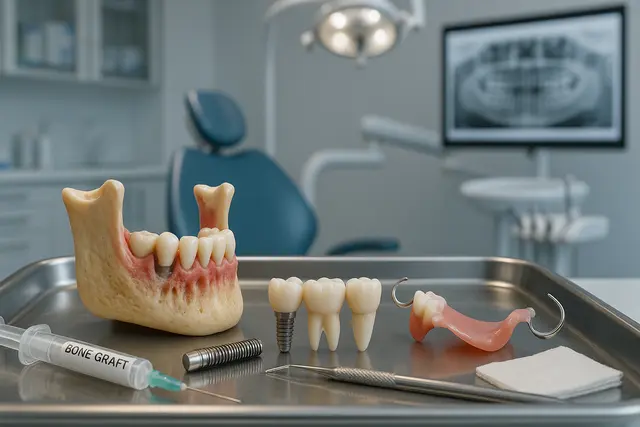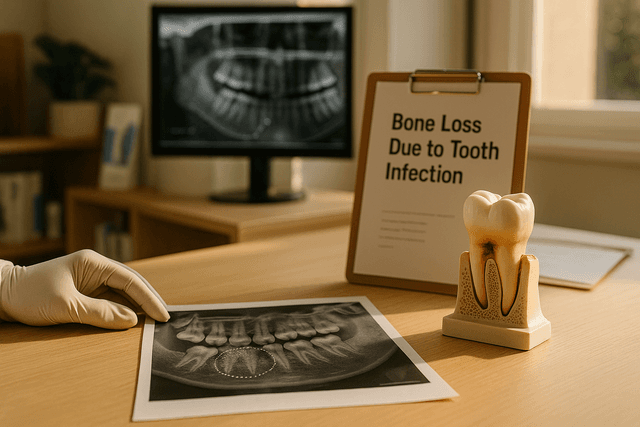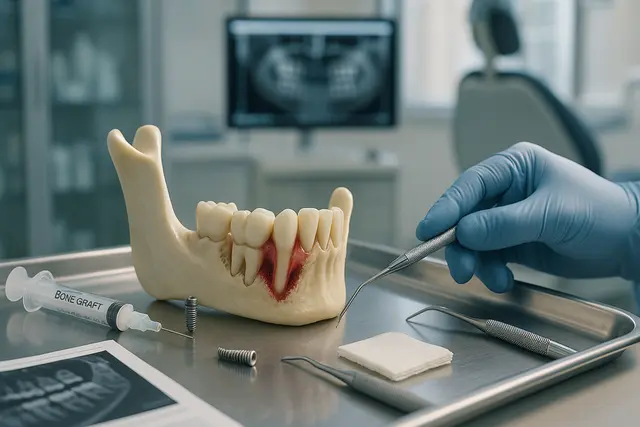Oral Health
6 min read
Jun 26, 2025
Tooth Feels Loose? Don’t Panic—Here’s the Real Reason
Ever noticed your tooth feels a little wobbly and instantly thought, “That can’t be good”? You’re not alone. A loose tooth can be unsettling, especially when you’re not sure why it’s happening or what to do about it. But before you assume the worst, take a deep breath. There are several common reasons your tooth may feel loose, and in many cases, it’s completely treatable.

There’s something undeniably unsettling about noticing your tooth feels loose. You're brushing your teeth one morning, minding your own business, when suddenly, wait a second, is that wiggling? You test it with your tongue (don’t pretend you didn’t), and yep, your tooth feels loose. Before you spiral into a panic, let’s talk about what’s going on, why it’s happening, and most importantly, what you can do to fix it.
Causes of a Loose Tooth in Adults: It’s Not Just a Kid Thing
Loose teeth are supposed to be a childhood rite of passage, not a surprise discovery during your morning routine. So when one or more adult teeth start to feel loose, it can be alarming. The good news? Not all hope is lost, and many cases are treatable.
One of the most common causes of loose teeth in adults is gum disease. If your gums pull away from the teeth, that’s a big red flag. Gum disease, particularly periodontitis, damages the ligaments and bone in the jaw that hold the tooth in place. As the ligaments that hold the tooth loosen or break down, your tooth may start to wobble like it’s considering early retirement.
Another major culprit is teeth grinding, a condition known as bruxism. You might be doing it in your sleep and not even know it. Grinding or clenching puts stress on your teeth and gums, slowly loosening the ligaments that support your teeth.
Sometimes, a loose tooth can occur due to direct trauma. Took a hit during your weekend basketball game? Yeah, that’ll do it. Or maybe you’ve just had recent dental work that’s made your tooth feel temporarily loose, this can happen, especially if the procedure affected the surrounding teeth and gums.
Hormonal shifts during pregnancy can also lead to loose teeth during pregnancy. It's weird, but true, hormones can mess with your gums and ligaments, causing your adult teeth to feel loose even if there’s no damage to the bone.
Lastly, there’s tooth decay. If decay reaches deep enough to weaken the tooth structure or the roots, the tooth may loosen from lack of support.
Why Your Tooth Feels Loose But Isn’t Falling Out
Here’s a reassuring fact: just because your tooth feels loose doesn’t mean it’s about to fall out. Adult tooth may feel loose for a variety of reasons that don’t always spell doom. Your teeth can feel odd or wobbly after intense cleanings, trauma, or even temporary inflammation around the gums.
In many cases, what you’re feeling isn’t structural damage, it’s the ligament that cushions the tooth reacting to irritation. These ligaments hold your teeth in place, and sometimes they stretch or swell. If that’s the case, the tooth won’t tighten overnight, but it also doesn’t mean it can’t recover.
Of course, ignoring it isn’t the answer either. The longer you wait, the higher the risk of that tooth is loose for good. If it’s from poor dental hygiene or gum disease, you’ll want to act before it leads to tooth loss.
What a Dentist Will Check When Your Tooth Feels Loose
The first thing to do when you notice a loose tooth? See a dentist. No YouTube hacks, no home remedies involving floss and wishful thinking. Just go.
A dentist may be able to figure out whether you’re dealing with an infection, gum recession, trauma, or even an ill-fitting dental appliance. Depending on the severity, your treatment for a loose tooth may range from deep cleanings to splinting or even more advanced interventions like a dental implant if the tooth cannot be saved.
They’ll examine around the tooth, assess bone loss, check your bite, and possibly take X-rays. They’re looking to see how much of the supporting structure is still intact and whether it’s possible to save the tooth.
Treatment Options for a Loose Tooth: What Actually Works
So, let’s talk solutions. Once your dentist pinpoints the cause of the loose tooth, they’ll recommend a treatment option or two (or three).
Here are some treatment options for a loose tooth that actually work:
Scaling and root planing: This is a type of deep cleaning procedure used for moderate to severe gum disease. It removes tartar and bacteria from below the gumline and smooths the roots, helping your gums reattach around the tooth.
Splinting: Your dentist may stabilize the tooth by bonding it to neighboring teeth on either side, creating a kind of buddy system. This lets the ligaments heal and gives the tooth a chance to re-anchor.
Flap surgery: In severe gum disease, flap surgery may be needed to clean infected areas under the gums and stitch them tighter to support your teeth better.
Dental implant: If your tooth doesn’t recover, or if there’s no hope to save the tooth, a dental implant is the go-to for long-term results in cosmetic dentistry.
Depending on the severity of damage and how loose the tooth feels, your dentist may offer a combination of treatments. The key is early action.
Don’t Wait: Prevent Loose Teeth With These Habits
Here’s the part where you roll your eyes, yes, we’re going to talk about brushing and flossing. But hear us out. If you want to prevent loose teeth, daily habits matter.
Brush at least twice a day with a soft-bristled brush
Floss daily to remove plaque your brush can’t reach
Rinse with an antimicrobial mouthwash to combat gum disease
Avoid smoking, which can destroy gum health fast
Schedule regular dental checkups and professional cleanings
And if you grind or clench your teeth, get a nightguard. Not a cheap store-bought one, a custom guard fitted by your dentist. It’s your best defense against pressure that can slowly loosen your adult teeth.
Also, take care of your body. Conditions like diabetes can weaken your oral hygiene defenses, making it easier for teeth to loosen over time.
Is It Possible to Save a Loose Adult Tooth?
In many cases, yes, it’s absolutely possible to save the tooth. But timing is everything. If you let a loose tooth become loose due to ignored gum disease or infection, the odds go down.
But when caught early, a loose front tooth or molar doesn’t automatically mean extraction. With proper care, cleanings, splinting, and improved hygiene, your loose tooth can be saved and remain part of your smile for years to come.
The longer you wait, the harder it becomes to save a loose adult tooth, so if your tooth is loose, please don’t “wait and see.” Get it checked.
Final Thought: Don’t Panic, Just Act
Finding a wiggly tooth as an adult is no picnic. It can feel scary, confusing, even embarrassing. But the real danger isn’t the tooth loose, it’s ignoring it.
Whether it’s due to gum disease, injury, or just grinding your teeth too much at night, loose teeth aren’t always lost causes. With the right treatment options for a loose tooth, it’s not only possible to save the tooth, but to strengthen the health of your whole mouth in the process.
So yes, your tooth feels loose, and that can be alarming. But now you know what might be behind it, what your dentist might suggest, and how to protect your teeth moving forward.
Your dental health is worth the trip to the clinic. Don’t wait for that loose tooth might turn into an empty space.
What Causes a Loose Tooth in Adults?
A loose tooth in adults is often caused by gum disease, teeth grinding (bruxism), trauma, or advanced tooth decay. Hormonal changes during pregnancy and certain health conditions like diabetes can also contribute. Identifying the cause early is crucial for effective treatment and preventing tooth loss.
Can a Loose Tooth Tighten Back Up on Its Own?
Sometimes, yes. If the looseness is caused by inflammation or temporary trauma, not permanent bone loss, the ligaments may heal with proper care. However, you’ll need to address the root cause, whether it’s grinding, poor hygiene, or gum disease, and see a dentist to monitor the situation.
How Do Dentists Treat a Loose Tooth?
Treatment depends on the cause and severity. Dentists may perform deep cleaning (scaling and root planing) for gum disease, use splinting to stabilize the tooth, or suggest flap surgery for more advanced cases. If the tooth is beyond saving, a dental implant might be recommended.
Is It Possible to Prevent Adult Teeth From Becoming Loose?
Yes, prevention is key. Brush and floss daily, use antimicrobial mouthwash, avoid smoking, and see your dentist regularly. If you grind your teeth, a custom nightguard can protect against pressure that loosens teeth. Managing health conditions like diabetes also plays a big role in keeping teeth stable.
Read Next
Related Posts

Oral Health
Tooth Replacement Options to Prevent Bone Loss
Losing a tooth isn’t just about appearance, it can have a lasting impact on your oral health, jawbone strength, and overall quality of life. When teeth go missing, the jawbone begins to shrink, which can change your bite, your facial structure, and even your confidence. Fortunately, modern dentistry offers several effective solutions to replace missing teeth and prevent further bone loss.
4 min read
Sep 26, 2025

Oral Health
Bone Loss Due to Tooth Infection Explained: What It Means for Your Oral Health
A tooth infection isn’t just about pain, it can quietly damage the tissues around a tooth and even erode the jawbone that supports your smile. This guide explains how infections start, why they can lead to bone loss, the warning signs to watch for, and the treatments that can stop the spread and rebuild lost support.
5 min read
Sep 25, 2025

Oral Health
Understanding Bone Loss in Teeth: Causes and Treatments That Work
Bone loss in teeth is a silent threat that can compromise your smile, facial structure, and overall oral health. While it often goes unnoticed in the early stages, it can lead to serious consequences if left untreated. Understanding what causes dental bone loss, and how to prevent or manage it, is key to maintaining a strong, healthy foundation for your teeth.
5 min read
Sep 25, 2025
Don’t have time to research every dentist around you?
See why 30k+ patients trusted us